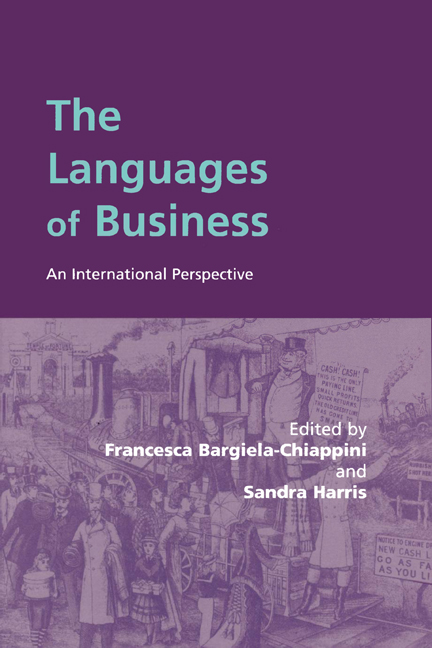Book contents
- Frontmatter
- Contents
- Chapter 1 The languages of business: Introduction and overview
- SECTION 1 INTER-CULTURAL DISCOURSES
- Chapter 2 Spoken discourse in the multicultural workplace in Hong Kong: Applying a model of discourse as ‘impression management’
- Chapter 3 Australian-Japanese business interaction: Some features of language and cultural contact
- Chapter 4 Requests in German-Norwegian business discourse: Difference in directness
- Chapter 5 The Asian connection: Business requests and acknowledgements
- SECTION 2 CROSS-CULTURAL DISCOURSES
- Chapter 6 Organisation in American and Japanese meetings: Task versus relationship
- Chapter 7 Bookshop service encounters in English and Italian: Notes on the achievement of information and advice
- Chapter 8 Joking as a strategy in Spanish and Danish negotiations
- Chapter 9 Lexical landscaping in business meetings
- SECTION 3 CORPORATE DISCOURSES
- Chapter 10 Languages within languages: A social constructionist perspective on multiple managerial discourses
- Notes
- References
- Notes on contributors
- Index
Chapter 5 - The Asian connection: Business requests and acknowledgements
Published online by Cambridge University Press: 24 September 2020
- Frontmatter
- Contents
- Chapter 1 The languages of business: Introduction and overview
- SECTION 1 INTER-CULTURAL DISCOURSES
- Chapter 2 Spoken discourse in the multicultural workplace in Hong Kong: Applying a model of discourse as ‘impression management’
- Chapter 3 Australian-Japanese business interaction: Some features of language and cultural contact
- Chapter 4 Requests in German-Norwegian business discourse: Difference in directness
- Chapter 5 The Asian connection: Business requests and acknowledgements
- SECTION 2 CROSS-CULTURAL DISCOURSES
- Chapter 6 Organisation in American and Japanese meetings: Task versus relationship
- Chapter 7 Bookshop service encounters in English and Italian: Notes on the achievement of information and advice
- Chapter 8 Joking as a strategy in Spanish and Danish negotiations
- Chapter 9 Lexical landscaping in business meetings
- SECTION 3 CORPORATE DISCOURSES
- Chapter 10 Languages within languages: A social constructionist perspective on multiple managerial discourses
- Notes
- References
- Notes on contributors
- Index
Summary
An effective cross-cultural communicator is often described as a person who has rather vague boundaries of self, who tolerates ambiguity well, and who is adaptable to new stimuli, social conventions and behavioral demands. This person is skillful at observing and interpreting the cultural features of behavior and displaying respect for other cultures and their peoples. Finally, this person is able to accept his or her own failures, understand his or her own cultural roots and their effect on personal behavior, and has a well developed sense of humor. (Baxter 1983: 307, quoting Pusch 1981: 99)
INTRODUCTION
Australians are particularly well-placed to engage in business with their Asian neighbours, not just because of geographic proximity, but because so many of the above characteristics fit their self-understanding. This is not to say that they are always good at these things, but rather that the cultural history of white settlement and multicultural growth has forced on Australians an awareness, and to some degree an acceptance, of otherness.
Australians responsible for both national policy and business are keen to strengthen connections with Asia. Politicians and senior business executives visit Asian countries on a regular basis, and invite their Asian counterparts to visit Australia. Asian students are encouraged to come to Australian universities, and cross-accreditation processes have set up the means whereby Australian students can undertake study in Asia. At home and in many Asian countries Australian trade organisations have been set up to assist and energise cross-national trade. It is a two-way process: Asians are encouraged to invest in Australia, and Australians are urged to seek opportunities to join in commercial ventures in Asia. The Commonwealth government has set up an organisation called Austrade, whose task it is to guide business organisations who have previously had little interaction with Asian businesses. In the current Austrade document, the following advice on communications at meetings with Japanese business is offered:
Speak slower than usual, be clear, well vocalised, precise in pronunciation, do not use colloquialisms. Expect little fluency in English speech from the Japanese (though they may be better at writing). Use interpreters, and remember to speak for their convenience, advise them in advance of specialised terms you will need to use.
- Type
- Chapter
- Information
- The Languages of BusinessAn International Perspective, pp. 94 - 114Publisher: Edinburgh University PressPrint publication year: 2020

